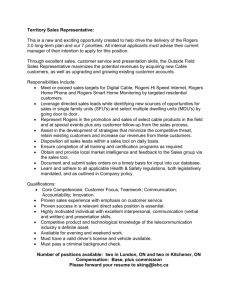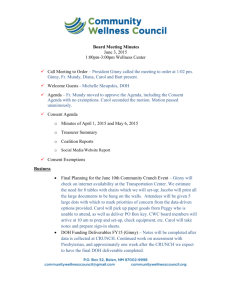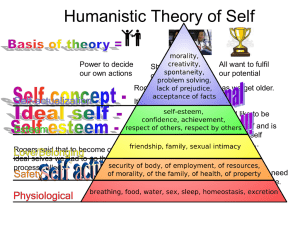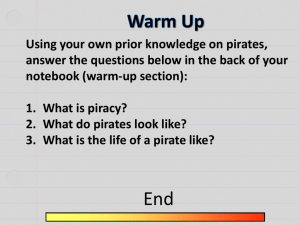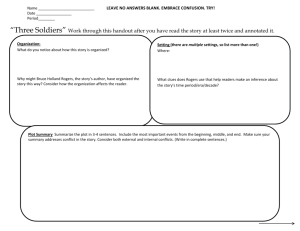traits of a leader others often do not have delegated authority but
advertisement
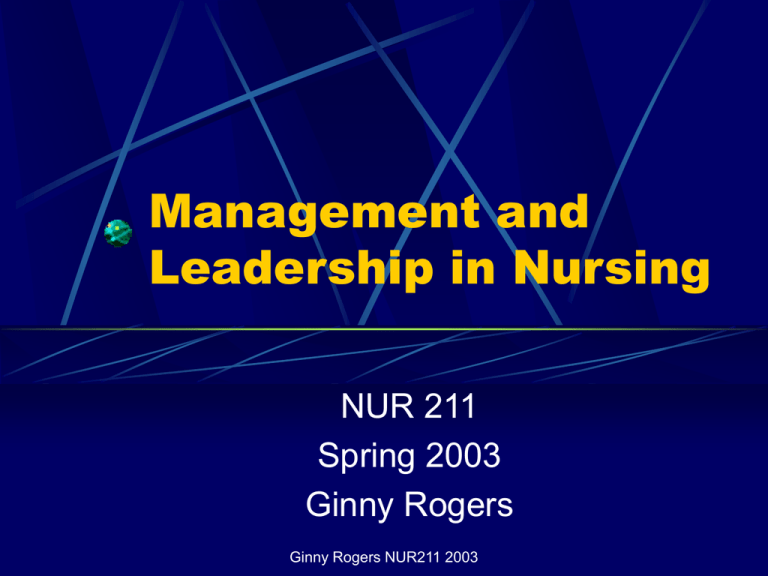
Management and Leadership in Nursing NUR 211 Spring 2003 Ginny Rogers Ginny Rogers NUR211 2003 “To be good is noble. To teach others to be good is nobler, and no trouble.” Mark Twain Ginny Rogers NUR211 2003 NUR 211 Syllabus and PowerPoints available on the web Final exam Room May 7th 11:00 AM – 1:00PM Weekly exams Project- see grading criteria page in Student Assignments Ginny Rogers NUR211 2003 NUR 211 Paper – see grading criteria page Journal See journal assignment eval. page ATI comprehensive exam passing rate Failure requires taking review class and retake Seminars – required, info will be included on exams Ginny Rogers NUR211 2003 Clinical information Read role definitions Weekly evals must be filled in by preceptor and signed, student must return to instructor with journal. Students must inform instructor of ANY problems immediately. Final evaluation- critical behaviors must be achieved independently by the completion of clinical work Please spend time looking over the final evaluation tool, if you feel you are unable to achieve any objectives in your facility, let your instructor know. This is your responsibility. Ginny Rogers NUR211 2003 Unit 1 Ginny Rogers NUR211 2003 Health Care Delivery Systems Reforms began ½ century ago DRGS – first federally organized incentive to keep health care costs down 1992 – Clinton’s task force looked at including the 40 M Americans w/o insurance (part of P.Bush’s agenda post war) Managed Care Refers to the assumption of responsibility and accountability for the health of a defined population and the simultaneous acceptance of financial risk. Care is population based ( imp. Change of Ginny Rogers NUR211 2003 Changes in Health Care MANAGED CARE COST CONTAINMENT CONTROL OF RESOURCES RESTRUCTURING OF HEALTH CARE ENVIRONMENT NURSING CASE MANAGEMENT Ginny Rogers NUR211 2003 Managed Care Care is population based All participants are held accountable\ Information to assess value will be necessary Primary care is of central importance Interdependence is very important Contracts are used to detail finances and delivery of care Ginny Rogers NUR211 2003 Nursing Shortage Aging work force Image Retention Emigration of internationally trained (controversial) Nurses need to be politically active Ginny Rogers NUR211 2003 Leadership Theories Great Man theory Charismatic theory Trait theory Behavioral school Autocratic Democratic Laissez-faire Eclectic Situational theory Contingency Model Ginny Rogers NUR211 2003 Life-Cycle theory New theory of leadership Transformational leadership Connective leadership Ginny Rogers NUR211 2003 Leadership Style and Leader Behaviors Leader –centered Group-centered Use of Authority by Leader abdicrat autocrat Tells Freedom of the group Sells Tests Ginny Rogers NUR211 2003 Consults Joi TRAITS OF A MANAGER HAVE AN ASSIGNED POSITION WITHIN THE FORMAL ORGANIZATION HAVE A LEGITIMATE SOURCE OF POWER DUE TO THE DELEGATED AUTHORITY THAT ACCOMPANIES THEIR POSITION ARE EXPECTED TO CARRY OUT SPECIFIC FUNCTIONS, DUTIES, AND RESPONSIBILITIES EMPHASIZE CONTROL, DECISION MAKING, DECISION ANALYSIS, AND RESULTS MANIPULATE INDIVIDUALS, THE ENVIRONMENT, MONEY, TIME, AND OTHER RESOURCES TO ACHIEVE ORGANIZED GOALS HAVE A GREATER FORMAL RESPONSIBILITY AND ACCOUNTABILITY FOR RATIONALITY AND CONTROL THAT LEADERS DIRECT WILLING AND UNWILLING SUBORDINATES Ginny Rogers NUR211 2003 TRAITS OF A LEADER OTHERS OFTEN DO NOT HAVE DELEGATED AUTHORITY BUT OBTAIN THEIR POWER THROUGH OTHER MEANS, SUCH AS INFLUENCE HAVE A WIDER VARIETY OF ROLES THAN DO MANAGERS ARE FREQUENTLY NOT PART OF THE FORMAL ORGANIZATION FOCUS ON GROUP PROCESS, INFORMATION GATHERING, FEEDBACK, AND EMPOWERING Ginny Rogers NUR211 2003 Traits of a Leader EMPHASIZE INTERPERSONAL RELATIONSHIPS DIRECT WILLING FOLLOWERS HAVE GOALS THAT MAY OR MAY NOT REFLECT THOSE OF THE ORGANIZATION Ginny Rogers NUR211 2003 ETHICS IN LEADERSHIP MANAGEMENT WITHOUT VALUES, COMMITMENT, AND CONVICTIONS CAN ONLY DO HARM” “WITHOUT INTEGRITY TRUST IS IMPOSSIBLE” Ginny Rogers NUR211 2003 Tnansformational vs. Transactional Leader Transactional is traditional, one person steps up, leader and follower/s have separate but related purpose Transformational leader mobilizes others, has a vision, and is values oriented Ginny Rogers NUR211 2003 Contingency Theories Fiedler’s theory Match the leadership style to the situation Situational leadership theory Expansion of above theory – looked at four leadership behaviors matching four types of followers Roles and Functions of Nursing Manager Read through the roles – not on test Ginny Rogers NUR211 2003 Characteristics of Organizations All organizations resemble one another Organizations are a cluster of suborganizations Organizations have similar problems Organizations have cylces Organizations have crises Some organizational goals are easier to meet than others Ginny Rogers NUR211 2003 Organizations - Theory Classical Theory Division and specialization of labor Chain of command Organizational structure Span of control Bureaucracy Neoclassical Humanistic Systems theory Closed or open Ginny Rogers NUR211 2003 Types of power Coercive Reward Legitimate Expert Referent Information connection Ginny Rogers NUR211 2003 Power and Leadership Image as power Power and professional influence Power plus vision How can nurses become more powerful? As individuals? As a group? Ginny Rogers NUR211 2003 Political Influence Allocation of scarce resources Interpersonal endeavors Collective activity Analysis and planning Image Ginny Rogers NUR211 2003 Political Action Framework Politics in the workplace Politics in government Financing Organizational politics Ginny Rogers NUR211 2003 Contingency Matches structure to environment Chaos Based on continuous change Health care organizations Types of Ownership Types of organizations Organizational Structure Horizontal Vertical Hybrid Matrix Parallel Shared governance Ginny Rogers NUR211 2003 Strategic Planning Values Vision Mission Statement Philosophy Goals Writing Mission Statements Ginny Rogers NUR211 2003
